 Petzlover
Petzlover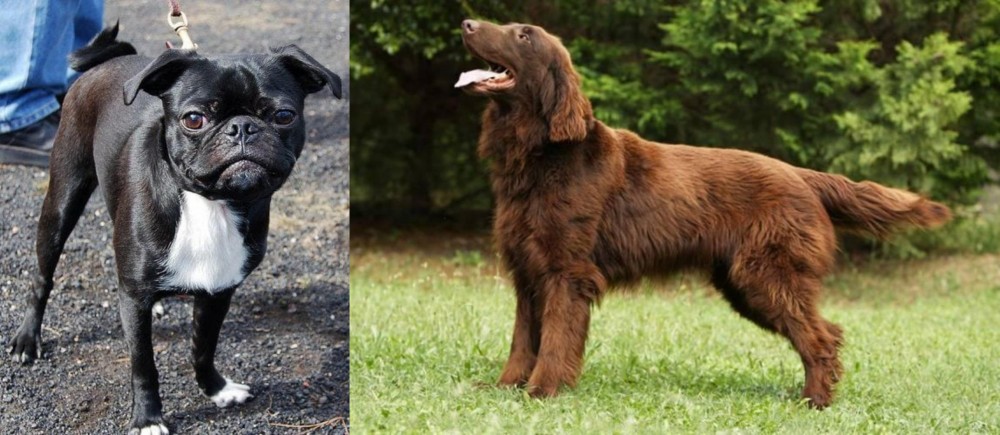 Bugg is originated from United States but Flat-Coated Retriever is originated from United Kingdom. Bugg may grow 23 cm / 9 inches shorter than Flat-Coated Retriever. Bugg may weigh 25 kg / 55 pounds lesser than Flat-Coated Retriever. Bugg may live 3 years more than Flat-Coated Retriever. Both Bugg and Flat-Coated Retriever has same litter size. Both Bugg and Flat-Coated Retriever requires Moderate Maintenance.
Bugg is originated from United States but Flat-Coated Retriever is originated from United Kingdom. Bugg may grow 23 cm / 9 inches shorter than Flat-Coated Retriever. Bugg may weigh 25 kg / 55 pounds lesser than Flat-Coated Retriever. Bugg may live 3 years more than Flat-Coated Retriever. Both Bugg and Flat-Coated Retriever has same litter size. Both Bugg and Flat-Coated Retriever requires Moderate Maintenance.
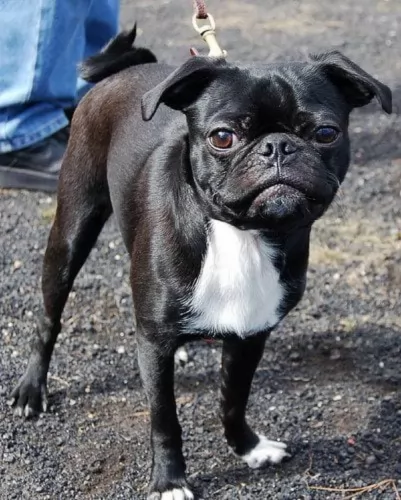 The Bugg is generally a cross between a Boston Terrier and a Pug. There is no clear history in terms of who started this hybrid dog that was recognized initially be the IDCR or International Designer Canine Registry in 2009. This very cute little dog has become increasingly popular in a very short period of time. Crossing these two breeds created a small dog that loves to sit in your lap as well a romp and play.
The Bugg is generally a cross between a Boston Terrier and a Pug. There is no clear history in terms of who started this hybrid dog that was recognized initially be the IDCR or International Designer Canine Registry in 2009. This very cute little dog has become increasingly popular in a very short period of time. Crossing these two breeds created a small dog that loves to sit in your lap as well a romp and play.
At this time the Bugg is recognized by several of the hybrid and designer registries and clubs. This would include in addition to the IDCR:
 The Flat-Coated Retriever traces its heritage to 19th century England. A popular gamekeepers’ dog, the actual descendants of the breed are not entirely known. Like so many well-established breeds, there are many lines of thought about the breed line. There is an unverified line of ancestry that includes the St. Johns Water Dog – an extinct breed from North America. Another story has Canadian sailors bringing their Newfoundlands to England and mixing them with Colliers and Setters. This story has more truth to it and it took 20 years to establish the final breed type.
The Flat-Coated Retriever traces its heritage to 19th century England. A popular gamekeepers’ dog, the actual descendants of the breed are not entirely known. Like so many well-established breeds, there are many lines of thought about the breed line. There is an unverified line of ancestry that includes the St. Johns Water Dog – an extinct breed from North America. Another story has Canadian sailors bringing their Newfoundlands to England and mixing them with Colliers and Setters. This story has more truth to it and it took 20 years to establish the final breed type.
The breed was originally a retriever with two purposes – to retrieve the hunters’ bounty on land and on water.
The Flat-Coated Retriever was then introduced to the United States as a gun dog. By 1873 it was a “stable type” and in 1915 the AKC recognized the breed. After this, their popularity grew quickly until the American public fell in love with the Golden Retriever and the Labrador Retriever. Then the Flat-Coated Retriever’s numbers and popularity fell. The irony was that both the Golden and the Labrador credited the Flat-Coated Retriever as an ancestor. The survival of the breed was questionable following World War Two. They were brought back by a specific breeding program in the 1960’s.
Breeders in the ‘60s made sure they bred for both show dogs and companion animals. The Flat-Coated Retriever survived and is less popular than other retrievers, but he has his fans. The breed is more popular in the United Kingdom than it is in the United States in part because of Best in Show wins at Crufts
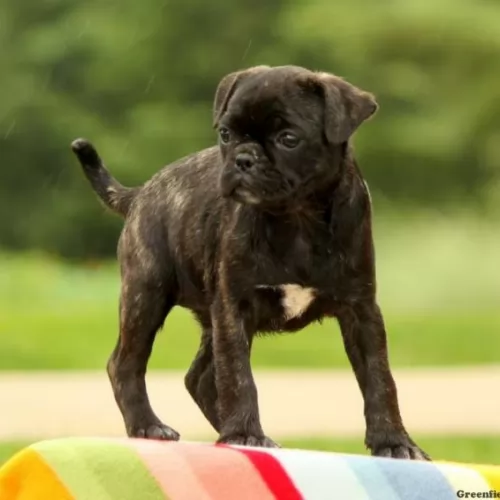 This cross between the Boston Terrier and Pug can have several different looks depending upon whether the individual dog resembles the Pug or the Boston more. Some usual but not always physical characteristics include curly tails, droopy ears and a stocky body in a small dog. They usually have soft, straight coats. Most Buggs look more like the Boston than the Pug although they have the more smashed muzzles and shorter legs of the Pug. The heads are round with almond shaped eyes.
This cross between the Boston Terrier and Pug can have several different looks depending upon whether the individual dog resembles the Pug or the Boston more. Some usual but not always physical characteristics include curly tails, droopy ears and a stocky body in a small dog. They usually have soft, straight coats. Most Buggs look more like the Boston than the Pug although they have the more smashed muzzles and shorter legs of the Pug. The heads are round with almond shaped eyes.
 The Flat-Coated Retriever has a straight and strong topline with unique head, strong jaws, a long muzzle and small ears. His eyes are dark brown almonds with a friendly and intelligent expression. He has an arched neck and a moderately long tail. The Flat-Coated Retriever is more of an athlete, lighter and certainly more elegant than any other type or breed of retriever.
The Flat-Coated Retriever has a straight and strong topline with unique head, strong jaws, a long muzzle and small ears. His eyes are dark brown almonds with a friendly and intelligent expression. He has an arched neck and a moderately long tail. The Flat-Coated Retriever is more of an athlete, lighter and certainly more elegant than any other type or breed of retriever.
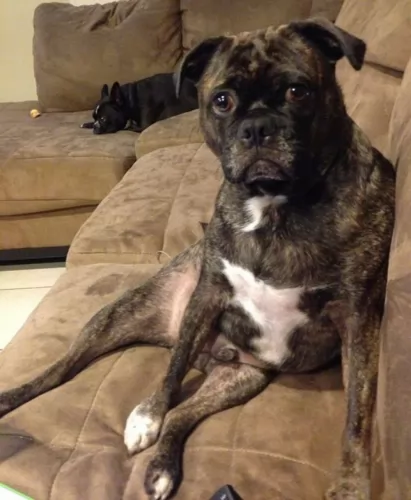 This crossbreed is easily trainable and highly intelligent. They might be stubborn like the Boston or devoted like the Pug. They can have characteristics of both parents and be loving, playful lapdogs. They love to play with children, but they can be territorial like the Boston. The Bugg is a small dog with a big attitude. They are affectionate and sweet, friendly towards people and other animals. Since the Boston and the Pug have very similar characteristics and temperament, you can have a pretty good idea what your Bugg will be like.
This crossbreed is easily trainable and highly intelligent. They might be stubborn like the Boston or devoted like the Pug. They can have characteristics of both parents and be loving, playful lapdogs. They love to play with children, but they can be territorial like the Boston. The Bugg is a small dog with a big attitude. They are affectionate and sweet, friendly towards people and other animals. Since the Boston and the Pug have very similar characteristics and temperament, you can have a pretty good idea what your Bugg will be like.
 The Flat-Coated Retriever is great with children. Just be careful they don’t knock over small children in their enthusiasm.
The Flat-Coated Retriever is great with children. Just be careful they don’t knock over small children in their enthusiasm.
They are confident great family dogs. They are “thinking dogs” and need something to work for or they will work for themselves. They can be clowns.
They are adaptable although their size might preclude small locations without yards.
Smart, thinking all the time, they are very trainable. However, they are considered the “Peter Pan” of dogs – they never grow up.
 Flat-Coated Retrievers have their share of health concerns from dysplasia to cancer. The breeds problems include:
Flat-Coated Retrievers have their share of health concerns from dysplasia to cancer. The breeds problems include:
Hemangiosarcoma, Osteosarcoma, Malignant Histiocytosis, and Fibrosarcoma. Studies show that about half of all Flat-Coated Retrievers die of cancer.
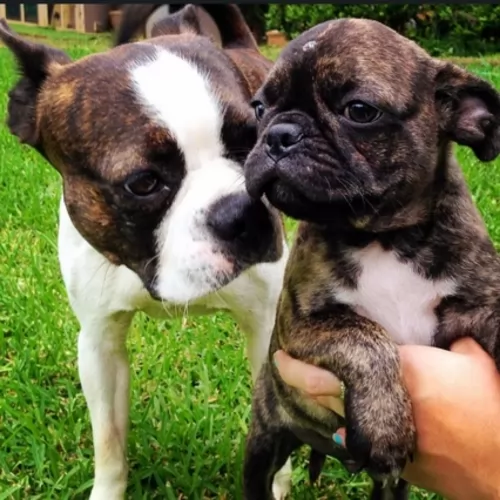 Buggs love to eat and will anything you give them and some things that you don’t. They can become obese very easily so watch their food intake. These small dogs should be eating food made for small dogs. Feed them only ¾ to 1 and ½ cups of dry food per day split into two meals.
Buggs love to eat and will anything you give them and some things that you don’t. They can become obese very easily so watch their food intake. These small dogs should be eating food made for small dogs. Feed them only ¾ to 1 and ½ cups of dry food per day split into two meals.
The Bugg can inherit health problems from either the Boston or the Pug, or they may be healthier than either parent breed. Both of these parent breeds are given to Brachycephalic issues due to their mashed faces. They could face respiratory issues or eye issues because of this.
The Bugg is a very energetic and playful dog. They love to run, play and go on walks. Just one walk or play session per day is enough exercise for this little dog. You can easily have your play time inside if you don’t have a fenced yard. Because of their faces and breathing issues do not let them get overheated.
 He will be a medium size dog. Feed puppies 3-4 times a day about a 1/8 cup of high-quality food. Feed a puppy food designed for medium size dogs or specifically for retrievers.
He will be a medium size dog. Feed puppies 3-4 times a day about a 1/8 cup of high-quality food. Feed a puppy food designed for medium size dogs or specifically for retrievers.
Feed 2 times a day about !/2 cups of dry food per meal. Do not overfeed. They have a tendency to be obese.
Maintain a healthy weight and avoid exercise before and after meals. The good news is dysplasia and epilepsy are rare in the breed.
They are very energetic and need good exercise. Long walks and a yard to run in. Remember they are hunting dogs and will chase to retrieve things so don’t let them off leash outside your yard. They will excel at agility, tracking. Rally, obedience, swimming, hunting, and jogging. They make great therapy dogs.